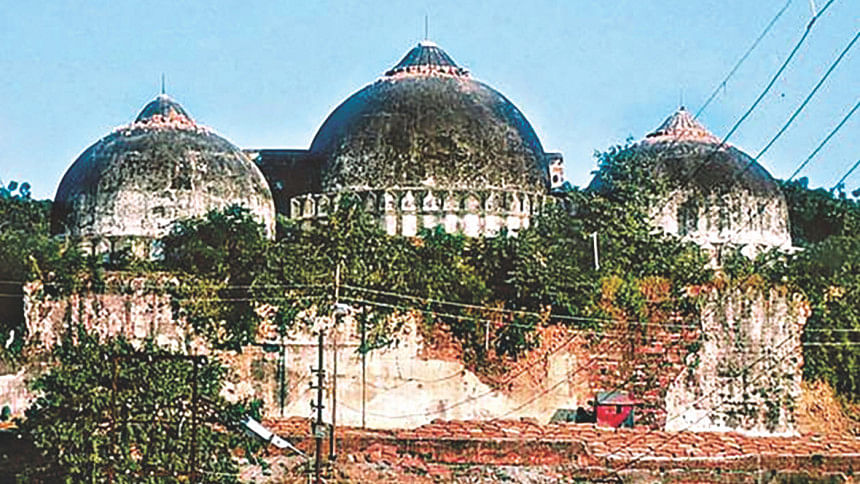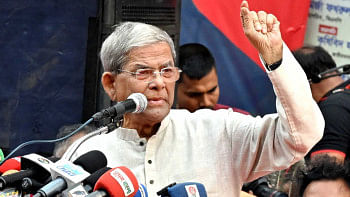Disputed land for temple, separate plot for mosque

India’s Supreme Court finally put to rest the politically sensitive Ayodhya land dispute delivering a rather balanced verdict yesterday in the title suit.
In a landmark judgement, a five-judge bench headed by Chief Justice Ranjan Gogoi ruled that the disputed 2.77-acre land will be taken over by a government trust for the construction of a temple, while a suitable alternative plot of land measuring 5 acres at a prominent site in Ayodhya will be given to UP Sunni Central Wakf Board for a mosque.
The Indian Supreme Court has asked the Centre to set up the board of trustees within three months after which the disputed land will be handed over to the trust.
The ruling in the dispute between Hindu and Muslim groups paves the way for the construction of a Hindu temple on the site, a proposal long supported by Prime Minister Narendra Modi’s ruling Hindu-nationalist party.
Yesterday’s judgment, which is likely to be viewed as a win for Modi’s Bharatiya Janata Party (BJP) and its backers, was criticised as unfair by a lawyer for the Muslim group involved in the case.
However, the group’s leader said ultimately it would accept the verdict and called for peace between India’s majority Hindus and Muslims, who constitute 14% of its 1.3 billion people.
In 1992, a Hindu mob destroyed the 16th-century Babri Mosque on the site, triggering riots in which about 2,000 people, most of them Muslims, were killed across the country.
Court battles over the ownership of the site followed.
Yesterday, the Supreme Court said, “the law must stand apart over politics, religion and beliefs”.
The judgement weighed heavily on the Archaeological Survey of India report. Archaeological Survey of India’s credentials are beyond doubt and its findings cannot be neglected, the chief justice said.
The Supreme Court observed that there is adequate material in the ASI report to conclude that the Babri Mosque was not constructed on vacant land and that there was a structure underlying the disputed structure, which is non-Islamic in nature.
Jubilant Hindus, who have long campaigned for a temple to be built on the mosque’s ruins, cheered and set off fire crackers in Ayodhya after the court decision was announced.
Thousands of paramilitary force members and police were deployed in Ayodhya and other sensitive areas across India, but there were no immediate reports of unrest.
“Today’s Supreme Court decision has given the nation the message that even the most difficult of all problems falls within the ambit of the constitution and within the boundaries of the judicial system,” Modi said in a televised address yesterday evening, calling for “a new India” free of hatred.
He had earlier tweeted that the verdict should not be seen as “a win or loss for anybody.”
The ruling comes months after his government stripped the Muslim-majority Jammu and Kashmir region of its special status as a state, delivering on an election promise to its largely Hindu support base.
Neelanjan Sircar, an assistant professor at Ashoka University near New Delhi, said the verdict would benefit the BJP, which won re-election in May, but a slowing economy would ultimately take centre stage for voters.
“These things don’t work forever ... Ram Temple isn’t going to put food on the table,” Sircar said.
Hindus believe the site is the birthplace of Lord Ram, a physical incarnation of the Hindu god Vishnu, and say the site was holy for Hindus long before the Muslim Mughals, India’s most prominent Islamic rulers, built the Babri mosque there in 1528.
A lawyer for the Sunni Muslim group involved in the case initially said it would likely file a review petition, which could have triggered another protracted legal battle, but its chairman Zafar Farooqui said later the verdict had been accepted “with humility.”
Muslim organisations, including the spiritual head of Ajmer dargah, appealed for calm.
The Hindu group Rashtriya Swayamsevak Sangh -- the parent organisation of Modi’s party -- had already decided against any celebrations to avoid provoking sectarian violence.
Restrictions were placed on gatherings in some places and internet services were suspended. Elsewhere, police monitored social media to curb rumours.
Across the border in arch-rival Pakistan, the foreign ministry said the decision “shredded the veneer of so-called secularism” in India and showed minorities were no longer safe.
A spokesman for India’s external affairs ministry responded by saying Pakistan had a “pathological compulsion” to involve itself in internal Indian matters.
In Ayodhya, the streets were largely deserted and security personnel patrolled the main road to Lucknow, the capital of the northern state of Uttar Pradesh.

 For all latest news, follow The Daily Star's Google News channel.
For all latest news, follow The Daily Star's Google News channel. 



Comments